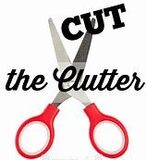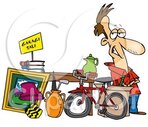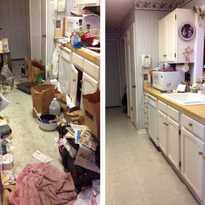
Have you ever looked around you and realized that every surface in your office is covered with something? How did this happen? Then you look around and see that your office isn’t the only room? Time to declutter. Clutter causes too much stress.
Everyone knows decluttering is not a simple task. But there are a few “need-to-knows” before you begin.
DIFFERENCES BETWEEN HOARDING, CLUTTERING, AND COLLECTING



WHY ARE YOU DECLUTTERING?
This seems like a useless question, but it isn’t. Knowing the reason you are doing something becomes an integral part of the decision making process. Some of the motivations for declutterling may include:
• Moving to a different house. Larger or smaller? Nearby or far away?
• Retirement (often goes with downsizing).
• Making room for an additional household member e.g. Grandmother or new baby.
• Removing personal items after the death of a spouse or a child who has married.
• Moving in with a roommate or vice versa.
• Need more space for new projects.
• Feel embarrassed to invite friends over.
• Can’t find anything or just can’t stand looking at the mess anymore; too distracting.
Whatever the reason, focus on it consciously and use it as one of the guides for decision making.
WHAT YOU NEED TO KNOW BEFORE YOU START?

● First, the ubiquitous reminder that decluttering is neither quick nor easy, and it is not going to be a one-time effort. It will be an ongoing process.
● Second, know why you are doing this.
● Third, do some thinking and planning in advance. The most prominent reason for clutter is lack of space, and/or lack of organization.
Think the process through from the beginning. Why do you have so much clutter? Do you have places for everything? Are they located conveniently in relation to their use? Could they be placed in your home more efficiently? Are there physical organizational helps you can use?
Think about how you will move those big bags of trash out of the house and to the trash bin. Will you need help? Do you know how and where to donate certain things to selected charities? Can you lift heavy boxes you want to store in the garage? Is there furniture you need to get rid of?

● Fourth, do you need someone else to help you? Do you need professional help? How do you find someone?
Process - The Multibox System
My friend’s professional declutterer brought three big bins and labeled them, Trash, Don’t Know, and Keep. Everything went into one of them.

● Trash – no good to anybody and should go to the land fill.


The pitfall with friends and relatives is contacting so and so to see if they want the item, and having to store it until they come for it. A week? Maybe that’s okay. You may still be involved in the decluttering. When I can get around to it? Uh-uh! All you'll be doing is moveing the clutters to another space.



You may not find items in all these categories in each room, and you will figure out which categories fit each room.
Where To Start
Before you dive in, think about your decluttering goal. Do you want to get rid of visible mess, or do you want to create entirely new household organizational systems to use going forward? Knowing what your end goal [your “Why?”] will help you prioritize tasks.
One approach is starting with the room that is easiest. For example, if you know you need to do an overhaul of your entire wardrobe, don’t tackle your bedroom at the same time. Don’t be over ambitious and take on more than you can do. The theory is that starting small and succeeding empowers you to take on the bigger tasks. For me, starting with small tasks in the worst room [like cleaning off two bookcases in an office] works better. By the time I finish that room, the rest are easier.
GUIDELINES
By now you have considered why you are decluttering, and have decided where to start. You have planned to set aside the time, made arrangements for help, extra trash bins, tools, etc. and contacted people to take things away. Now you’re ready for guidelines!
● Set a realistic goal for your daily project.
If you can do it all in one day, you are merely cleaning a messy room thoroughly. Only take on as much as you can do. “Today I am going to clean out two book cases in my office and move one of them into the extra bedroom.”
● Reject the “I-might-need-it-someday” temptation
It’s true. You might, but probably not. And the item has no doubt been through the “maybe someday” test more than once. Don’t talk yourself into keeping something you don’t use and haven’t needed to some time.
A friend of mine and her husband have a small apartment. Every year they go through their closet and anything they haven’t worn for a year goes out [excluding tuxedos and ball gowns]. No matter how new it is, what they paid for it, how much they “love” it, etc. If you haven’t worn it in a year, you don’t need it. These are things you may feel better about away if you can find them a good home.
● Don’t let your mind guilt you into keeping things.
Many of us keep things we don’t use or even like “because Grandma gave it to me.” Or you spent way too much money and feel guilty every time you see it and don’t use it.
Melissa, writing for simplelionheartlife.com/ writes “It’s important to find ways to work through the guilt so you can focus on only keeping the things that add value to your life.”
Whether or not the item adds value to your life is the key. You may want to keep your Grandma’s gift, not because you like it but because it brings comforting feelings about your grandmother and makes you feel better. Don’t part with those things.
Ditch the item you paid too much for and never use. That can only bring stress to your life every time you see it.

Just deciding what to keep and what to throw out doesn’t count if you don’t finish. You have to clear the bookshelf, and pack the give-away books into a box for the “friends of the library” store. Then you have to see that the box gets there. Now that you’ve cleaned off the bookshelf, don’t leave it in your office to collect more junk. Be sure it gets moved into the extra bedroom.
● Don’t Try to reorganize or clean until you are through decluttering
Even though you should think about reorganization of your worldly goods before you start the process, once you are into it, stay focused on what you are keeping, not what you are getting rid of. And don’t try to organize things, clean, or put things away until the decluttering process is complete. Don’t buy an organization system before you complete the process.
All these things become distractions from the business at hand.

In my opinion, this is one of the most common distractions from finishing the process. You start looking at pictures or reading something from college and pretty soon you are completely off track and the time is gone. Decide whether or not you are going to keep these, put them in the “Keep” box and get on with it.
Another similar trap occurs when decluttering an office and trying to assess with professional information and papers are still timely and worth keeping. You can get into readying every document. I’m a writer and have problems with notes from meetings about writing, procedures for contacting editors, yada, yada, yada. Tons of paper. Then it occurred to me that the publishing business has totally changed in the last twenty years, and none of the material was pertinent any more. I pitched the whole file cabinet.

Bite the bullet and make the hard decisions. You want to avoid that “I don’t know” box as much as possible. The more times you consider whether or not you want to toss something, the more unsure you’ll become. All those little interferences mentioned above come to haunt you again.
The reason people are clutterers depends on many factors, and getting old may be one of them. Elder adults have additional challenges to overcome. They've been around long enough to have collected a lot of possessions. The number and kind has, no doubt, been trimmed several, if not many, times over the years, but much of what a senior retains has made the cut more than once.
Despite previous decluttering efforts, elderly adults eventually slow down and it seems to take twice as much time and energy as it used to for any simple task. The day doesn’t go as far, and it’s easy to get behind. It’s not a big deal if the house or certain rooms become a bit cluttered. It’s harder to keep up.

At this point, the elderly person is usually looking for a permanent home for possessions they have been saving to leave to members of the family when they die. If having enough space is an issue, it’s preferable, but not always possible, that Aunt Clara’s Limoges Dinnerware be taken away by the heir, not stored in the senior’s closet or garage.
● Even if the elder adult is are not moving to another location, the individual may still have many possessions that are no longer used or needed cluttering the living space. If the home is cluttered, loose carpets and things underfoot may cause real dangers such as increased fall risk, preventing emergency workers from helping the senior, and unsanitary living conditions. Cluttering can easily morph into hoarding, and it might also be a sign of serious conditions related to Dementia.
Too much stuff attracts dust mites that aggravate asthma and allergies. If the senior accumulates combustibles or stacks of boxes in front of doors, the person may be subject to fines from the fire authorities.

Seniors need a specific and unchanging storage spot for everything, particularly medicine and important items. Those locations need to be logical and convenient to the life style.
Once one establishes the habit of putting objects in the same place, if the location is convenient the person has enough triggers to remind them where it is. However, the place for medicine you need to take with lunch should not upstairs in the bathroom, but near where you eat lunch.



● Seniors have a tendency to over-buy. One reason is economic. Another might be the person is dependent on others to get to the grocery store and doesn’t want to run out.

For toilet paper, yes. But three half-gallons of pepper, maybe not. Even if you use a lot of pepper, by the time you’ve used a half-gallon and need more, you won’t remember where the others are. When you can’t find it – because it is stored in some unusual or hard to reach place -- you buy it again.

TAKE AWAY
In dealing with anyone, the issue of neatness and housekeeping is touchy; with seniors, even more so. It’s great when someone realizes their problem and seeks help. However, If the individual is unaware of the mess or doesn’t care, whomever is helping or trying to intervene needs to be very careful how the situation is handled. There are resources available to assist:
Recources:
There are a number of companies in every state who provide decluttering services.
Also check
•https://www.aarp.org/caregiving/?cmp=KNC-BRD-MC-REALPOSS-TODAY-GOOGLE-SEARCH-CAREGIVING&
• https://hoarding.iocdf.org/
• https://www.napo.net/
• https://savvysenior.org/
Just Sayin'
Sources:
https://seniorsafetyadvice.com/decluttering-tips-for-seniors/ **very good article
https://www.nia.nih.gov/health/how-aging-brain-affects-thinking#:~:text=Blood%20flow%20in%20the%20brain%20may%20decrease.%20Inflammation%2C,younger%20individuals%20on%20complex%20memory%20or%20learning%20tests
https://simplelifeofalady.com/declutter-quotes/#:~:text=Declutter%20Quotes%20that%20will%20Inspire%20You%20to%20Declutter.,that%20you%20need%20to%20buy%20it)%20More%20itemsServices
.
https://www.servicemastersanfrancisco.com/difference-cluttering-collecting-hoarding/#:~:text=A%20person%20with%20hoarding%20issues,on%20the%20everyday%20household%20functioning
https://www.lean-news.com/decluttering-your-workspace-with-5s/
https://www.paulsrubbish.com.au/difference-between-clutter-hoarding/
https://individuals.healthreformquotes.com/aca/essential-benefits/mental/resources/organizing-hoarding-cluttering/
https://www.clutterhoardingcleanup.com/resources/hoarding/difference-between-hoarding-and-clutter
https://medium.com/swlh/the-difference-between-clutter-and-hoarding-d1da8ae7e349
https://www.psychologytoday.com/us/blog/mess/201509/clutter-vs-hoarding-vs-collecting
https://www.clearwaterliving.com/news-blog/declutter-and-downsize-4-tips-for-older-adults
https://www.huffpost.com/entry/help-for-seniors-who-are-drowning-in-clutter_b_4094093
http://domesticmommyhood.com/10-free-resources-help-clear-clutter-organized-home/
 RSS Feed
RSS Feed